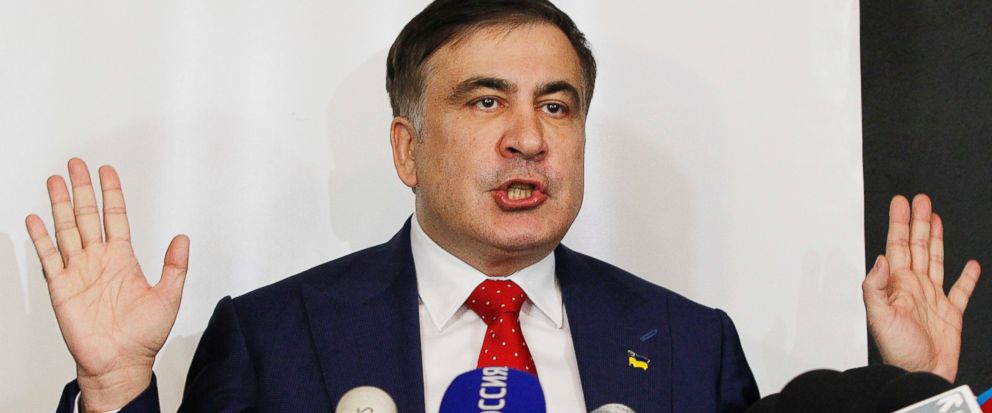The entire history of the arrival of the former Georgian president in Ukraine up to his deportation from our country is a chronicle of folly and disrespect for the rule of law. Mikheil Saakashvili turned up here already at the end of his political career. Efforts were made to convince Ukrainians about his reformist achievements. The question about why a successful reformer had to leave his country and hide from Georgian justice has always remained in the shadows.
Saakashvili always had a simple answer to this question -- it was because a "pro-Russian oligarch" came to power in Georgia. As to the question why, after the era of reforms, Georgians elected this oligarch's party, and the courts, the law enforcement agencies, and the media turned out not to be independent has also remained unanswered. Because this answer would have been unpleasant both for Saakashvili and his former friend Petro Poroshenko.
Saakashvili was appointed head of the Odesa Oblast Administration not because he was an outstanding reformer but because President Poroshenko decided to use the reformer myth to weaken the influence of his then rival, the oligarch Ihor Kolomoisky. Kolomoisky, whose energy helped preserve stability in the Dnipropetrovsk Oblast and prevent its occupation by Russia, could have assumed that his new "kingdom" included the neighboring regions as well. Primarily, because the Odesa Oblast was governed by his colleague Ihor Palytsia.
The Saakashvili decision became one of the main methods for weakening Kolomoisky and ousting him from Ukrainian politics. And Saakashvili himself was transformed into a politician no longer of Georgian or even Odesite caliber but a Ukrainian one. This is what was successfully used by Poroshenko in his fight with another rival for power -- Prime Minister Arseniy Yatseniuk.
Poroshenko and Saakashvili succeeded here as well, but at the cost of discrediting the authorities, by disillusioning the population on reforms, and by substituting priorities -- from the need for the radical renewal of a poor, backward country to the fight against corruption, which has become a new religion of the masses.
However, Poroshenko's success did not mean success for Saakashvili. Poroshenko strengthened his power and Saakashvili was left with no power. Because under conditions of a parliamentary-presidential republic, it is impossible to impose any appointments. And also because the president no longer needed him.
And then Saakashvili turned his propaganda weaponry against his former ally. He had every reason to be offended -- he had been used and discarded and he was not selective about the means after such an offense.
Poroshenko was not selective about the means either. He deprived Saakashvili of citizenship and accused him of violating the law and concealing information. However, the criminal prosecution of the former president of Georgia was not a secret when Saakashvili was receiving his passport. Simply Saakashvili was needed then. So nobody read his applications.
After the revocation of citizenship, the struggle between the former allies passed into the "soap opera" phase. But this spectacle is disastrous for Ukrainian statehood because it undermines confidence in it. The penetration of the border, the freeing of Saakashvili by his followers after his detention in Kyiv -- all this solidified the image of Ukraine as a "fragile state" among the country's residents and in the surrounding world . And Saakashvili himself recently began to refer to Ukraine as a "failed state." In fact, we witnessed a clear reluctance by the security forces to participate in the president's conflict with his former friend. The Ukrainian state and society once again appeared not so much weak as divided. And it is this disunity that is helping our enemies.
In his struggle with Poroshenko, Saakashvili increasingly resembles the Russian oligarch Boris Berezovsky. Berezovsky also contributed to the rise to power and the growth of the influence of his friend Vladimir Putin, convinced that he would become an important figure in the new regime. And when he turned out to be not needed by the new president, he devoted his life to fighting him.
But Poroshenko in his fight with Saakashvili also behaves as Putin did with Berezovsky. He used his friend to strengthen his power and when his friend was no longer needed, he used the entire power of the state machinery against his former aide. Simply the Ukrainian machine is weaker than the Russian one. But this is for now.
Because the entire history with Saakashvili has demonstrated the absence, both in government and society, of an elementary sense of political hygiene and aversion to populism. The end justifies the means -- both for politicians and ordinary citizens.
Saakashvili cannot win over Ukraine simply because he is viewed as a foreigner by most of the country's residents. And this is why he can rely only on the support of his own followers and retired politicians. But as soon as a strong home-grown populist appears with the same energy and charisma, he will take over all of Ukraine without much effort.
And then it will turn out that Saakashvili was right that you and I are living in a "failed state."

